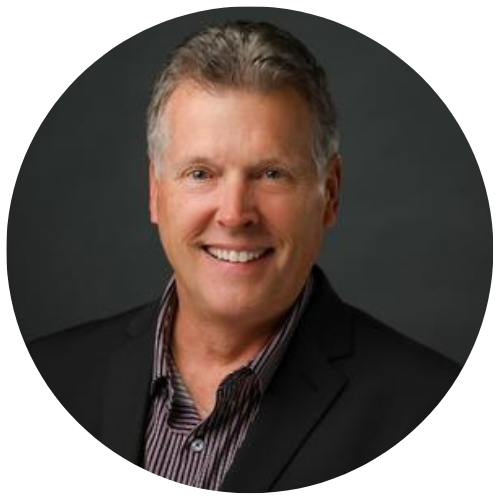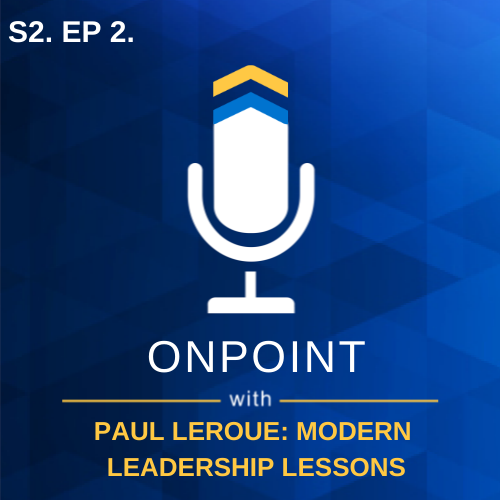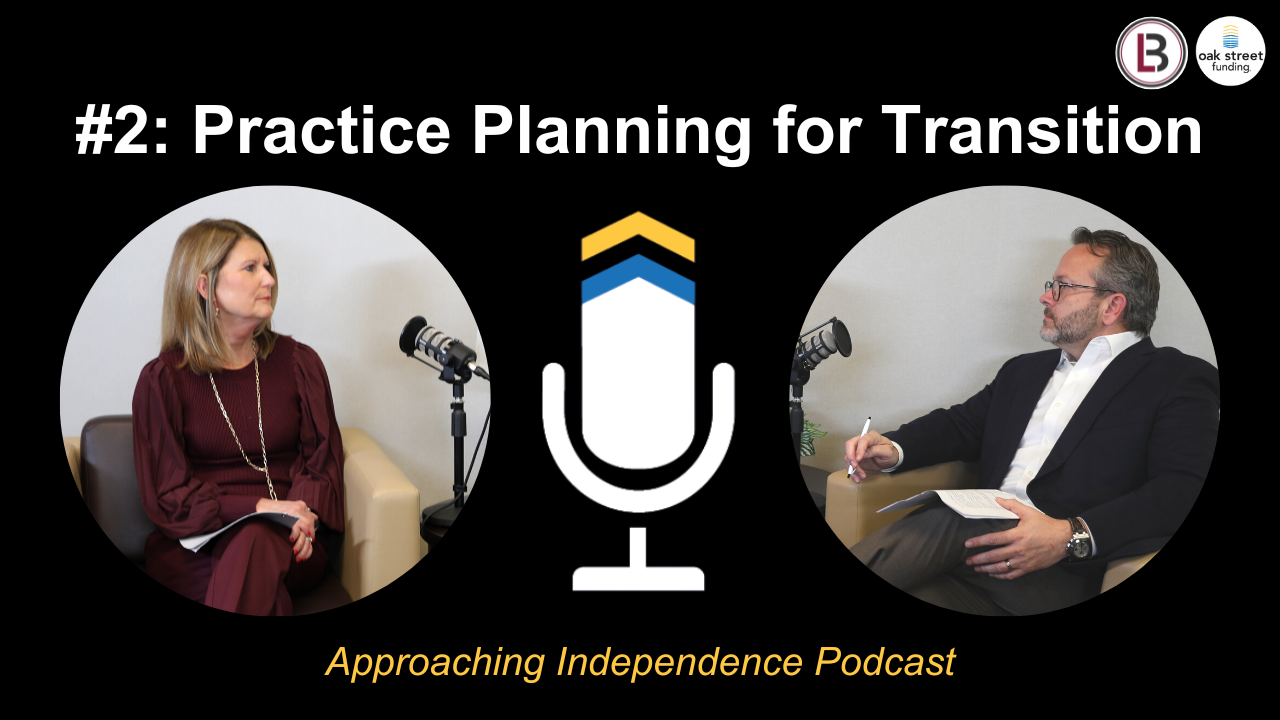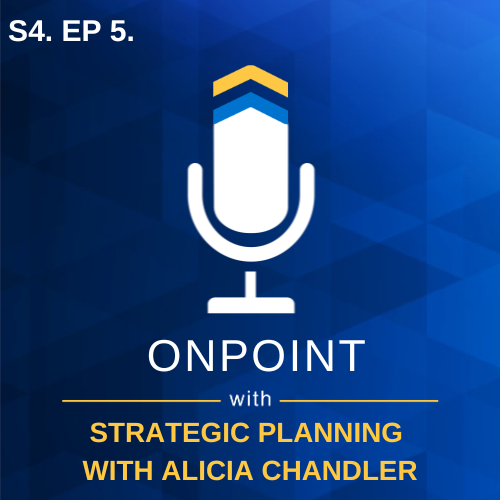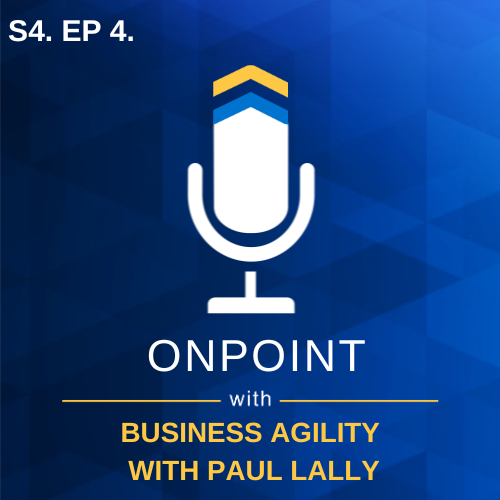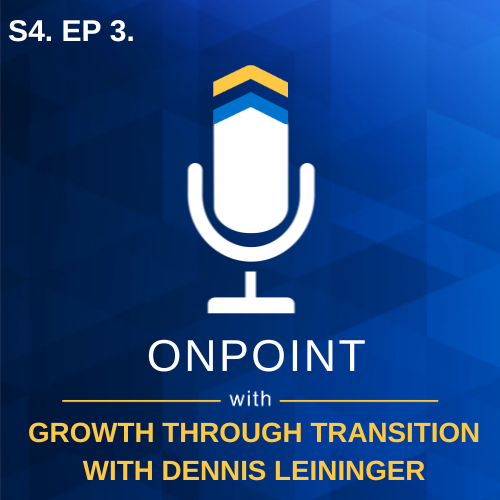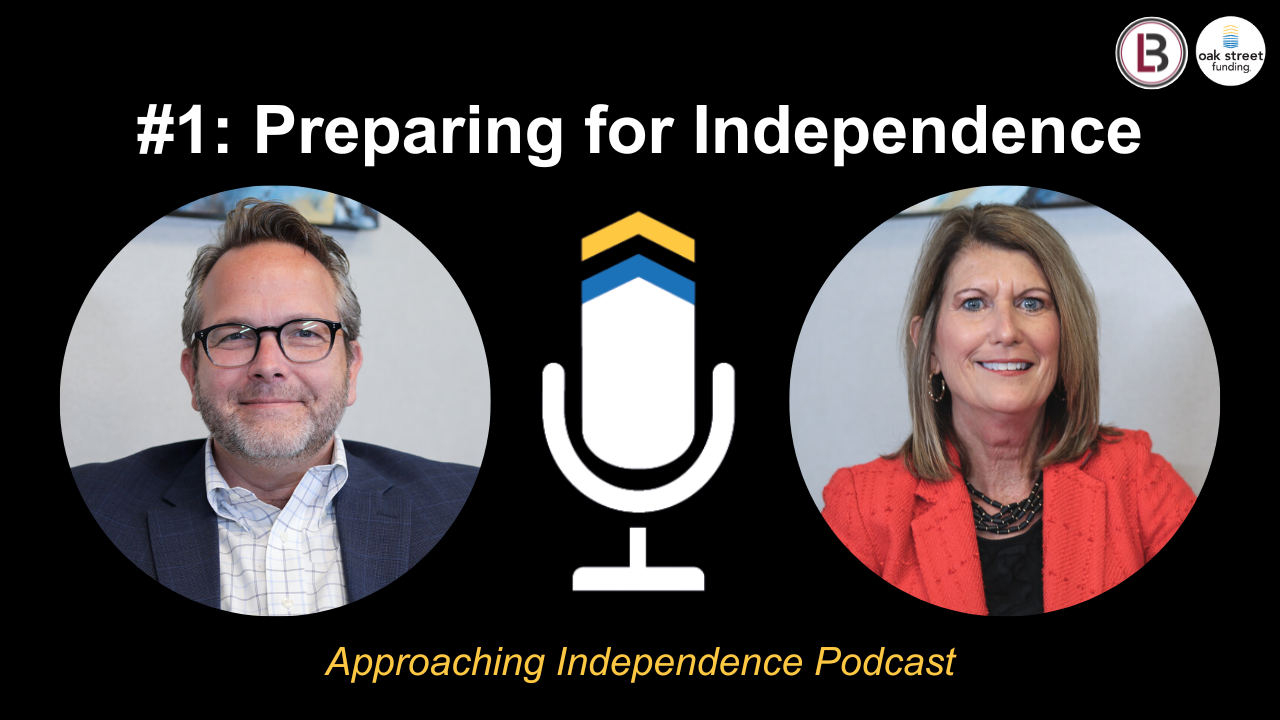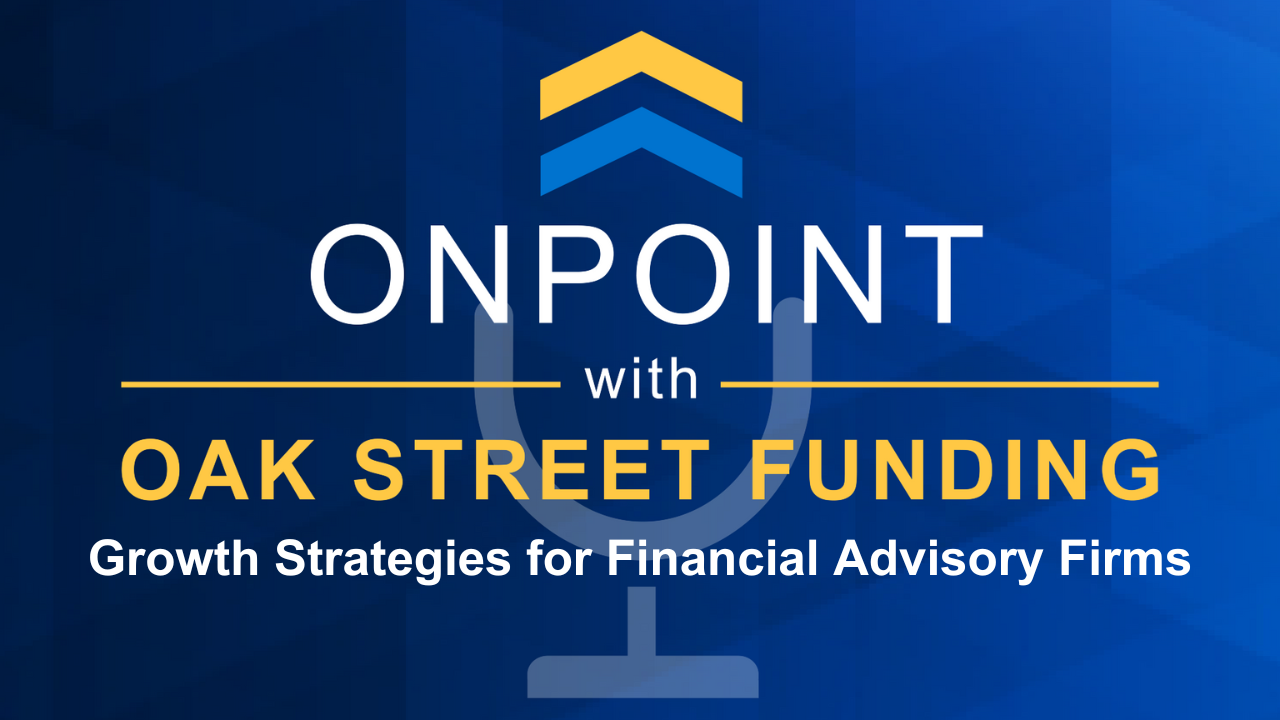S2. Ep. 2 - Modern Leadership Lessons with Paul Leroue of Wipfli
- 0.5
- 1
- 1.25
- 1.5
- 1.75
- 2
Bridget Haight: Hi, and welcome to OnPoint, a Podcast by Oak Street Funding, where we bring research and data-backed insights to dig into the minds of industry leaders to learn how to stand out, navigate and break through this ever- changing industry. I am your host Bridget Haight, and you can support this podcast by following us on Spotify, Apple Podcasts, on our website, or really wherever you get your podcasts. We will be there hanging out, talking to industry leaders and ready to empower you to grow your business. Now, let's get OnPoint. Today we welcome Paul Leroue, Principal and Chief Marketing Officer at Wipfli. Paul is an experienced executive leader with a proven record of building successful marketing organizations, launching new brands and optimizing overall organizational performance. Today, Paul is going to share modern leadership lessons to help all business leaders transform their business teams. Welcome to the show, Paul.
Paul Leroue: Thanks, Bridget, appreciate it.
Bridget Haight: So we are here today to talk about leadership. So to start off, could you just describe your leadership style?
Paul Leroue: Oh, it's a good question. So I've been an executive coach for 25 years, so that always comes up, what is your leadership style? And it's fair to say that over the last 20 to 25 years, everybody's leadership styles should have transformed quite a bit. Well, I know we're going to talk about that today. But I would say I'm inclusive, very inclusive, meaning I talk to a lot of people, very collaborative, not consensus driven, but collaborative driven, meaning get the best insights from the people that you lead. I think today you have to be highly communicative, meaning overcommunicate, overcommunicate, overcommunicate, because getting people aligned is really super important. And when you communicate relentlessly, you keep people aligned. I'd like to say I'm motivating, I try to be motivating as much as I can.
Bridget Haight: I get motivating off of you. (thank you)
Paul Leroue: Yeah, I try to get motivating as much as I can. And then the other thing is I focus on making progress. I think sometimes in leadership, there's this pursuit of perfection. And I always tell our team, "Look, it's not about perfection, it's about progress. Let's just make progress. Let's take one step forward today." And so I think sometimes leaders want perfection. And it's hard to perform to perfection, right? If the bar keeps changing or if you don't know what perfection is defined by. So to me, it's making progress every week, and there's little recipes that I know we're going to talk about today on how to do that.
Bridget Haight: Great. So what is a modern leader and how are they different from a traditional leader?
Paul Leroue: Yeah. Well, another great question. So here's what I think has changed, today, if you're a leader in the workforce, you're leading a four generation workforce, right? So that's the first time in our history that if you're a leader you're potentially with four generations, you've got millennials there, you've got X'ers there, you've got boomers there. I mean, it is literally a cadre of people. And so your leadership style needed to evolve and change with that. And so I think boomers, early on when they were dominating the landscape and leadership, which is really '80s and '90s and in almost up to 2000, they were pretty much taught a style called, what I call, command and control. You knew who was in command and you knew who had control. And that style does not work anymore. It just simply doesn't work anymore. So you need to cultivate followers and you need to build community and you need to have this incredible intelligence that goes beyond intellectual intelligence, so I call that social intelligence, emotional intelligence and intellectual intelligence, and be trained in all those areas. And I think I've learned, in my 41 years of doing this, that you're still in kindergarten when you're a leader, there's no PhD in this program, right? And I think if you think you are going to get a PhD, that's when you start falling back, it's got to be this willingness to be a lifelong learner, committed to always being better at your trade every single day. And I think sometimes we, as leaders, forget about that. That this is a discipline, we learn it and it's skill based, and we can get better at it. And so when I do executive coaching, I often will have to pry out of people, "Tell me a little bit about what works for you and what doesn't work. What's your light side of your leadership and what's the dark side of your leadership." And every leader has a dark side. And unfortunately that dark side was maybe from examples that they got when they were coming up right through the leadership ranks, right? Maybe they had two or three people who taught them wrong or who were dominant leaders and they learned that style and just took it into their style. So this willingness to learn to adapt to evolve is all part of the modern leadership game now. And as I go around the country and I talk on leadership, I realize that I think some people just stopped at some point. And said, "I've been a leader for 20 years, I'm good to go." And I just would encourage leaders to jump back into the sandbox, pretend like you're in kindergarten again, and be willing to learn.
Bridget Haight: I love that. So how about this transformational leader term? What makes a transformational leader?
Paul Leroue: Yeah, so it's a term that's being used quite a bit today and it's defined differently by a lot of different people. So I'll give you some of the characteristics of I think what transformational leaders should do, okay? One, they should build powerful vision and that vision should be motivating and inspiring and getting people to follow is really, really important. I think we forget that we're vision builders. It doesn't mean that we need to be a visionary, that's different. It means that we build powerful vision through other people, maybe that vision comes from within our organization, but we relentlessly build it and then we follow it, right? So we have a vision and we have a plan to get there. The other part is we're developing leaders at all levels of the organization. It used to be that the powerful leader that ran organizations, and we could go back in the'90s and revisit some of those leaders, there was one powerful leaders and a lot of small leaders, right? And now I think it's about developing leaders at every single level, and really investing in developing your leaders. So it's not about a succession plan, it's really about having strong leaders leading all the disciplines of your organization or strong leaders across your whole organization. A third thing I think is important is learning how to cascade power and decision making. So I do a lot of teaching on power theory and on decision making, the old command and control leader had all the power and made all the decisions, and today a transformational leader actually pushes that down into the organization. So if you and I were talking and going back and forth, I would probably say, "Hey, Bridget, why don't you tell me how you would make the decision," instead of me making the decision. And that's a very different style. It used to be someone would walk in and go," This is my recommendation, you make the decision." Now I say to them," What decision would you make?" Meaning we're teaching people how to make good decisions.
Bridget Haight: And how to be invested too.
Paul Leroue: And how to be invested, right? So I think that's really important. I will always say that creating a cultivating a positive culture is important. In fact, I would advocate there's a different word right now out there called community building, that's really important, that goes even beyond culture. And let me just dissect that for a second. I grew up in a small town and in that small town you knew everybody in the community, right? So if Saturday you were going to go build a garage, it wouldn't be weird to have 18 people show up with hammers and come build the garage with you, because that's just the way it was. Well, community building within our organizations is really, really important. I think we went from cultural activities, which just are things that we do together, to now intentional community building. And that I think is a shift for transformational leaders, how do I build purposeful community within my organizations? So that's super important. And then the last aspect I would say is leading perpetual change. When I started in the game, a long time ago now, change would happen about twice a year. It was like a cardiogram, change and then no change, and then change and then no change. Well, the fact now it's, change, change, change, change, change, change, it's changed all the time. And in fact, your ability to keep an organization constantly in this change cycle and get them through is part of what being a transformational leader is all about. It's hard to push people through change when it happens so fast. I mean, we really rebel against change, most of us do in our life. Whatever change you throw at us, we really don't like it. But the fact is, the market is changing so fast and things are coming... Technology has changed and providing this information so fast that we're constantly changing. So transformational leaders need to be experts in leading perpetual change, and a lot of us really don't go to leadership school, right? We go to college and we get a degree and our degree is in marketing or business, but we don't get a leadership degree, which I think is kind of a shame. I think we should actually have to go to leadership school. And so we're learning along the way, right? It's different for us. And I think this term transformational leader is there because we want you to transform where you are today into this new style and be comfortable with it, because that's what's going to make you successful.
Bridget Haight: Okay. So transformational leaders have a driving vision. What are the four components of a compelling vision?
Paul Leroue: So I'll give you five, because I think they are five. I think it starts off with the big picture. What is the big picture? Where are we going? Why is it important? Why are you involved? I call that the big picture. The second part of it is the plan, right? So you can have a great vision, and if you have no plan, the vision is really a hallucination, right? If you have a plan, then you've got a shot. Then it's about people, and the part that people play, right? So what part do you play as a person in this organization? So people are essential, you cannot reach your vision without people. I think we would all agree to that. If you're a leader, you can't do it yourself, you got to have a people part. I think there's a process part, which is what is the process we're going to follow as we plan. What are the milestones and the benchmarks and the things that we're going to have to measure along the way that tell us we're making progress. I think that's forgotten about a lot of times. So I'll see organizations set a 10 year goal a lot, they call that their vision, and then they're not measuring progress on a cadence that allows people to see progress is being made, right? So you got to keep people in the loop. If you want them to be supportive of your vision, you need to show them milestones of progress and then celebrate those milestones, whether they're successes or failures, because you'll fail a little bit. You're going to fail when you go for visions. And I think the last part is what I called the part. And I hit it a little bit on people, which is everybody needs to have a part in the vision. So I think years ago in leadership we would say one powerful leader could drive the vision and we would all just follow. And today that's a recipe for failure because people want to be a part of the vision, they want to play a part in helping an organization grow. They want to play a part in the success. They want to play a part in maybe getting some of the reward as the vision grows. So I tell people, don't forget about the part piece, it's really important.
Bridget Haight: All right. So what is the biggest challenge of transformational leadership?
Paul Leroue: The shift in style is very dramatic for people. Being a great listener, and what I call an active listener. And telling people, "Quiet, listen, hear people out," is a skill that's not intuitive to a lot of people. Being a collaborative leader, I think people feel that collaborative leadership takes time and they're not willing to take the time to be a collaborative leader, and what I would say is collaborative leadership gives you the best ideas. And make sure you hear all the voices that you need to hear before you make a good decision. So that's huge. And then what I call common ground, you are not always going to make everybody thrilled in leadership. What you fight for is what I call common ground. You'll have people who dig in on each side of the issue all the time. We know that politically that happens today. We know that happens a lot. But it's not about digging in, it's about finding a spot that you can both go to where you both have a win. Now you're both going to lose a little bit, but you're both going to win a little bit. And I think a lot of leadership is finding common ground and then moving people through once you find the common ground. So those are some early recipes.
Bridget Haight: So, you might be repeating yourself here, but I have to ask, why is transformational leadership important?
Paul Leroue: Because today's multi-generational workforce will not work for a command and control leader anymore. They just simply aren't motivated by it. They're not inspired by it. You're going to lose people faster. You're not going to retain people. People want to work for a inspirational leader who listens to them and takes the best ideas and moves them forward. And in a lot of ways, we're not used to that style. And I think that's okay, but I think what we're trying to get people to do with this podcast, and there are times when I speak on the stage, is get people to try it on and see if it works. And I've learned through the years that... Do you make everybody happy? No, but that's not the point. The point is you collaborate, you move in a direction, you talk to a lot of people, you listen well, then you communicate relentlessly and you got a good shot.
Bridget Haight: Which makes the workplace a more enjoyable place to be.
Paul Leroue: Yeah, absolutely. And I'm doing things on the communication side I never thought I would do before.
Bridget Haight: Such as?
Paul Leroue: Well. I do a monthly round table where people can just come to lunch, I do it over lunch. Bring your lunch, ask me any question you want. I send out, every Friday, no matter where I am, even if I'm on vacation, a report called the Friday Flash. And in the Friday Flash is everything that's going on in the organization, praises for the people who did great work for the week, some things that we're working through that are tough, issues that we're dealing with as a team. And every week that goes out on Friday, no matter where I am. And it goes out by noon, I try to get it out by noon every week. And it's an alignment tool, it keeps everybody on the same page on what we're working on. That we're succeeding at things, we're not doing well in other areas and we've got to continue to push forward in the following areas.
Bridget Haight: So modern leaders have an unusual labor situation to deal with, the pandemic, the great recession have brought about radical shifts in the labor market. So how do you approach hiring and retaining talent in this environment?
Paul Leroue: Yeah. Well, it's a multidimensional playbook today. We talked a little bit about building a great culture, building a great community, some of the recipe, things that you need to do as a leader, certainly you've got to do all those. And then you've got to look at, a gig workforce. You've got to look at, we have what we call almost like an anytime, anywhere policy, which is if you want to work out of your home and you're productive, great. It's okay. I think modern day offices are going to start to disappear, that's a little sad, but I do think people are accustom... COVID kind of got us working out of our home and now we've found out we could actually be pretty good and we don't have to spend an hour and a half on the road every day. And so I think you got to look at anytime, anywhere policies. I think you've got to look at a flexible labor force, which is, I'm willing to hire people who only want to work 24 hours a week. I'm okay with that, I don't have to have everybody working 40 hours a week, which I think gives a chance for at- home moms and different labor people who are really, really talented that go," I can't work full time." So I think between gig and flexibility and anytime, anywhere, and then just your relentless pursuit of great leadership as a leader, all those are a recipe for helping you with this sort of workforce challenge that we have right now. I think there's a rumor out there that the young people don't want to work hard.
Bridget Haight: I've heard that rumor.
Paul Leroue: Yeah. And let's just get rid of that rumor right away. I think they have looked up at the boomer generation and said," I don't want that to happen."
Bridget Haight: I don't want that.
Paul Leroue: Yeah. I don't want to see a 55% divorce rate. I don't want to see people who are burnt out in their 50s and done. And so they're creating a new definition of work- life balance. I'm actually pleased to see that come forward where we begin to say," Hey, determine what your a hundred percent is." So if you're a hundred percent's 40, or you're a hundred percent's 50 hours, or you're a hundred percent's 24, we can figure out a way to make that fit within our workforce, within our global workforce strategy. And that's different for us, I think it's forcing us to think about really good labor in a good way. More creativity than we had before, which is just recruit, bring them on board, retain. That was the old playbook, and that playbook doesn't work fully anymore.
Bridget Haight: I think that's good. So our next podcast guest will share the value of inclusive leadership, how do you build a culture that embraces diversity?
Paul Leroue: So that's a big word, the diversity word, because it could mean everything from diversity, equity and inclusion, It could mean that. I think what we try to do in our organization and what I try to do as a leader is, here are all viewpoints, here are all issues, include as many people as I possibly can. And we do a lot of steering committees, we do a lot of task force. Those are things that I didn't do in the past, I would just come out of the cave and declare, it worked in the'80s and the'90s, well that style does not work today. So inclusive to me is involving people, changing your style to be collaborative, be willing to work through and listen to other viewpoints that allow you to reach a good decision. And I've found you do that and people are invested in listening and people are invested in hearing from others that you do end up with better decisions. I can honestly say I've made better decisions in the last 10 years than I made in the 30 years prior, which means I'm still learning and growing, still having been in the game a long time, I am still at that stage of learning and growing. So I think inclusive leadership, diversity in leadership, all those things can mean a lot of things. I think we lean into DEI at Wipfli, it's important to us, but we also talk about how we treat people, how we work with people in the workforce and how we include people before we make big decisions. And I think that's helped us transform our leadership style.
Bridget Haight: Great. So there may be listeners who would say, "Oh, Paul, everything you've shared sounds great, but how will this affect my bottom line? I don't have time to waste on something that won't help me meet my financial objective." So what would you say to those people?
Paul Leroue: I don't think you can achieve your financial objective without it, right? So if you're losing people, they're walking out the door as fast as you're bringing them in the door, if you're not a leader who's adapting to some of the new styles out there, you are actually going to hurt your bottom line dramatically. So I think we should play the opposite end of the coin, what happens when I'm not this way? And what happens when I'm not this way is your organization begins to deteriorate. It's not as effective operationally as it should be. Your leaders aren't developing at every level. You have lots of single points of failure in your organization because you're not cascading power and decision making and you're not developing other leaders. So I think the cost is actually greater if you don't pay attention to it. Does it take time? Yes. I think one of the things we don't do is realize that leading takes a percentage of time, right? If we have a hundred percent week, we fill it up with returning calls, staying on top of our clients, doing all the things that we need to do, and we save a 2% sliver for leadership. And I think it's much bigger than that, I think it's always a piece of what you have to do, connecting and talking to people and sitting down and having a cup of coffee and investing in relationships and getting to know people for who they are. It's just part of what you need to do today. And if you do those things, your bottom line will go the other way, it will go up. Your revenues will go up. Your bottom line will go up. Your culture will be healthy. People will enjoy working for you. You'll retain people a lot longer. We all know the cost of losing an employee today, it's expensive to keep losing people, the retrain is huge. So let's eliminate that, let's change our style and begin to be the leader that the organization needs to propel forward.
Bridget Haight: Great. So what would you say to the leader who is interested in becoming a modern leader, but doesn't know quite where to start?
Paul Leroue: Be willing to learn and grow, okay? So the first thing you sit back and say is," Am I willing to invest in me being a better leader?" That's your first question. You look at that, write it on a piece of paper and go," Am I willing to invest?" Because it is an investment. Lots of great places that you can go, but we used this analogy earlier, are you in kindergarten or are you a PhD in leadership? I think you're in kindergarten, because today's modern leadership calls for learning, growing and evolving. And if you're not investing in that, chances are you're going to hit a threshold. Your organization's going to hit a threshold, you're going to hit a threshold. No one likes to work for that leader who's not learning and growing, who's not authentic and transparent and real about who they are. So I think that's the thing. If there was one thing that people took away from this podcast it would be, am I willing to invest in my leadership? Certainly, I'm an advocate of executive coaching at certain points in your career, because executive coaches peel you back a little bit and show you some things that you look in the mirror and can't see. So investing in executive coaching is really good. But there's podcasts and webinars, so many things to see today around leadership. It's time, are you willing to take the time?
Bridget Haight: Yep. What is one final modern business leadership lesson for our listeners?
Paul Leroue: I would tell them become a phenomenal communicator and a phenomenal listener. You don't have to be as articulate in terms of speaking as you do if you're a great listener and you're a great communicator in terms of listening to people and communicating to people a story and becoming comfortable with being authentic and real. I think if you can move that into your leadership style... People like to work for people that they like to be with, right? And if you can look up at a leader and go," I really like to work for Bridget. She does a great job. She inspires me. She motivates me. She helps me see the right things. She's developing me as a person and as a leader." You're going to retain people. Those are hard to come by. So that'd be the one thing.
Bridget Haight: Okay. This has actually... This has instilled hope in me for the workforce. This has been great talking to you, so thank you.
Paul Leroue: Yeah, well thank you for having me.
Bridget Haight: I do have one last question. We do something a little off the cuff for the last question.
Paul Leroue: Okay, go ahead.
Bridget Haight: So I would like to know, and our listeners would like to know, who is your mentor and what is the most important lesson you've learned from them?
Paul Leroue: Wow, I had a lot of great mentors along the way. I can tell you there was a guy that I met named Bob Mumford years ago. And Bob was like the Yoda of leadership. And I remember it so many times, I would sit next to him in the chair and he would say things to me like," Quit taking yourself so serious." Or he'd say," Look in the mirror and understand what's really coming out." Or he would say," Let's evaluate your dark side because it's overlapping your light side." So I think finding a mentor who can speak into your life and really push your authenticity is powerful. And Bob was able to do that for me. And Bob's probably 90 years old now, but he had such wisdom on leading and helping and nurturing and taking care of people. And so those lessons of sitting alongside of his chair when he just would throw the one liner at me and I'd go," Wow, I didn't expect that challenge." I'll remember that the rest of my life.
Bridget Haight: May I ask how you knew Bob?
Paul Leroue: I got to know him through another friend, and we met, Bob was probably in his upper 70s when we met. I met him in Denver, Colorado, and his ability to just speak into my life at that time was perfect. I think timing was right. I found his stuff very inspirational for me. And it spurred me to develop some of my own stuff and begin to think about maybe writing a book someday, which I really would like to do. But I met him and it just worked. That it was two common souls who got together and I was like," Everything this guy says has so much power," for where I am at that point in my life. And I think there was a willingness for me to go there. I do tell leaders a lot of times that vulnerability's a really good trait, because vulnerability allows you to walk in and go," I am willing to change." And if you do that, you learn a lot about yourself quickly. And Bob could look into my soul and go," That's got to change." And I was willing to listen and I was willing to change. So that was probably one of my most powerful mentors.
Bridget Haight: Paul, this has been so lovely. Thank you so much for your time today -
Paul Leroue: Well, thank you, Bridget. I appreciate it.
Bridget Haight: Well, thank you all for listening to OnPoint a podcast by Oak Street Funding, where we bring research and data- backed insights to dig into the minds of industry leaders, to learn how to stand out, navigate and break through this ever changing industry. I'm Bridget Haight and tune in next time, wherever you listen to podcasts, to hear Kirsten Petras, executive director of Oak Street Funding, discuss the value of inclusive leadership. See you then as we get OnPoint. And don't forget to subscribe and leave us a review. Thanks for listening, to get in contact with someone at Oak Street Funding, please call 844-353-8022, that's 844- 353- 8022 to learn more.
DESCRIPTION
In this episode, we welcome Paul Leroue, Principal and Chief Marketing Officer at Wipfli. Paul is an experienced executive leader with a proven record of building successful marketing organizations, launching new brands, and optimizing overall organizational performance. Listen as Paul shares modern leadership lessons to help all business leaders transform their business teams. Call 844-353-8022 to learn more about Oak Street Funding today!
Today's Host
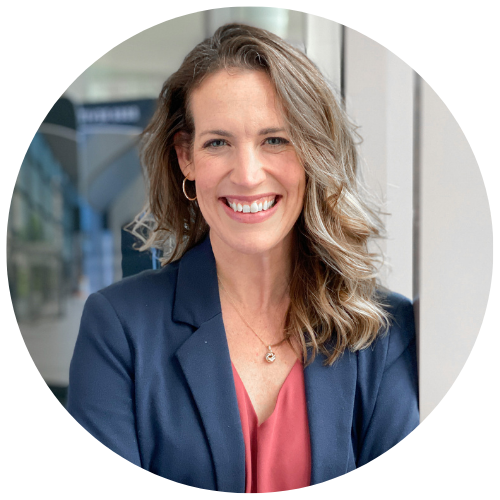
Bridget Haight
Today's Guests
